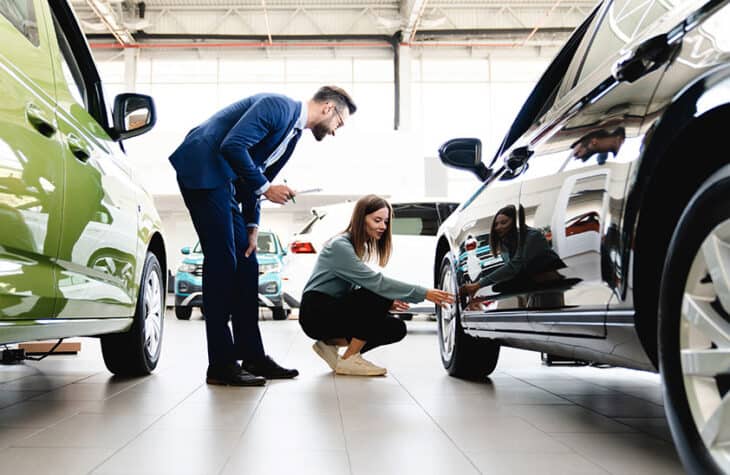What Is Curbstoning? How to Avoid This Common Used Car Scam

Buying a used car privately can be a smart way to save money, but only if you know what to watch out for. One of the biggest risks when purchasing from a private seller is falling victim to a scam known as curbstoning. At Sound Credit Union, we want to help you make confident, informed financial decisions, starting with understanding how to protect yourself when buying a vehicle privately.
In this guide, we’ll explain what curbstoning is, why it’s a problem, how to identify it, and the steps you can take to protect yourself and your wallet.
What Is Curbstoning?
Curbstoning is when an unlicensed dealer poses as a private seller to offload used cars often to avoid consumer protection laws. These sellers, known as curbstoners, sell cars from public locations like curbs, parking lots, or online classified ads (Facebook Marketplace, Craigslist, Offerup, etc.), rather than a licensed dealership.
Because they’re operating illegally, curbstoners don’t offer warranties, fail to disclose known issues, and often disappear after the sale. Buyers are left without any recourse if problems arise.
Note: The Seattle Times reports that up to 80% of used cars sold through online classifieds may be tied to curbstoning.
Why Is Curbstoning a Problem?
Curbstoning allows shady dealers to bypass legal protections designed to keep buyers safe. If you unknowingly buy a curbstoned car, you might end up with:
- A salvage or flood-damaged vehicle: A salvage title means the car was deemed a total loss by an insurance company, often due to a major accident, fire, or severe weather event. A flood title indicates the car has suffered significant water damage, usually from hurricanes or flooding. These vehicles are often unsafe, unreliable, and can have electrical or mold issues hidden beneath surface-level repairs.
- Odometer tampering: Curbstoners may roll back the mileage to make the car appear less used, which inflates its value and misleads you about its condition.
- Unreported accident history: A car may look great on the outside but have internal damage from a previous crash. This can affect everything from alignment to safety.
- Lemon status: A lemon is a vehicle with serious, unresolvable defects. Even if it was repaired, it could still have lingering issues and a poor resale value.
- No warranty or legal protection: Since curbstoners operate outside of dealership laws, you’re left with no protection if the car breaks down shortly after purchase.
Is Curbstoning Illegal?
Yes, curbstoning is illegal in most states. It’s a violation of consumer protection laws for someone to repeatedly sell cars for profit without a dealer’s license, especially while misrepresenting themselves as a private seller. Unfortunately, curbstoners often fly under the radar, which is why it’s essential to know how to spot them.
How to Spot Curbstoning: 8 Tips
1. Search the Sellers’s Phone Number
Copy and paste the seller’s number into a search engine like Google. If the same number is linked to multiple car listings, this is a major red flag that they may be a curbstoner posing as a private seller.
2. Ask Vague Questions
Call and simply say, “Hi, I’m calling about the car.” If the seller responds with “Which car?”, that’s a giveaway that they’re selling multiple vehicles.
3. Get a Pre-Purchase Inspection
Spend $100 or so to have a trusted mechanic inspect the vehicle. A pre-purchase inspection can reveal hidden issues like frame damage, leaks, or engine problems that could cost you thousands later.
4. Pull a Vehicle History Report
Use the VIN (Vehicle Identification Number) to get a vehicle history report from trusted sources like CARFAX or AutoCheck. These reports can reveal serious red flags, such as:
- Salvage or Flood Titles
- Odometer Tampering
- Previous Accidents
- Lemon Status
5. Check for Remaining Warranty
Check whether any portion of the manufacturer’s warranty is still active and transferable. Newer or low-mileage used cars may still be covered, which can offer peace of mind.
6. Compare Driver’s License and Title
Always ask to see the seller’s driver’s license and car title. Make sure the names and addresses match. If not, you could be dealing with a curbstoner selling someone else’s car, or worse, a stolen vehicle.
7. Watch for “Selling for a Friend” Stories
If the seller claims they’re “selling it for a friend” or “helping out their uncle,” be cautious. Curbstoners often use these stories to explain away mismatched documents or lack of ownership.
8. Report Suspicious Sellers
If you suspect curbstoning, report it to:
- Your state’s Department of Motor Vehicles (DMV)
- Local consumer protection agencies
Final Thoughts: Stay Smart and Shop Safely
Buying a used car from a private seller can be a great way to get a deal, but only if you do your homework. By understanding the meaning of curbstoning and taking the right steps to protect yourself, you can avoid costly mistakes and make a confident purchase.
Need financing for your next used car? Credit unions like Sound CU often offer competitive auto loans even for private party sales. Don’t assume your only option is paying cash or buying a “junker.” We can help you explore your loan options so you can afford a safer, more reliable car.
Feeling stuck? Contact Sound Credit Union today.

Tammie Atoigue
Tammie Atoigue is the Vice President of Consumer Lending at Sound Credit Union, where she utilizes her extensive experience to empower members in achieving their financial goals. She is passionate about member education, particularly around credit and smart borrowing, and frequently participates in industry speaking engagements to share her insights.





